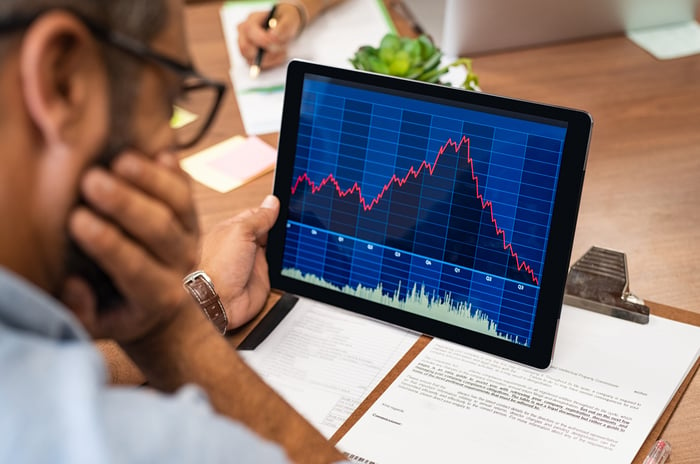Dating back multiple generations, no investment vehicle has been a more proven wealth-builder than the stock market. Since the beginning of 1980, the average annual total return (i.e., including dividends) of the broad-based S&P 500 is over 11%, which trounces assets like housing, bonds, and gold.
But compared to select cryptocurrencies over the past couple of years, these returns are laughably small. This is especially true for the ultra-popular Shiba Inu (SHIB -4.74%), which has gained more than 11,000,000% since its debut day on Aug. 1, 2020.

Crypto investors have had an insatiable appetite for Shiba Inu-themed coins in 2021. Image source: Getty Images.
Here's how SHIB gained more than 11,000,000% in 15 months
How, exactly, does a digital currency gain over 11,000,000% in what amounts to a little over 15 months?
Clearly, the fear of missing out, better known as FOMO, is playing a role. Cryptocurrency investors have sat back and watched Bitcoin near almost an 8,000,000,000% gain since its debut in July 2010 and are looking for the next digital currency that can go to the proverbial moon. Since crypto investors tend to be younger, their appetite for risk and volatility tends to be higher than most. Long story short, they're willing to chase these big gains even higher.
The launch of decentralized exchange ShibaSwap in July has helped push SHIB higher, too. The key aspect of ShibaSwap is that it allows "hodlers" to stake their coins in order to earn passive income. This will not only improve liquidity for SHIB, but also encourage investors to hang on for longer periods of time. In a little over three weeks, the median hold period for SHIB has doubled from six to 12 days.
Tesla Motors' Elon Musk is also responsible for sending Shiba Inu to the heavens. Even though a look under the hood revealed Musk doesn't own SHIB, he nevertheless posts Shiba Inu dog memes on Twitter with some regularity. The world's richest person recently adopted a Shiba Inu dog, which he named Floki.
Lastly, visibility has been important. A growing number of cryptocurrency exchanges have listed Shiba Inu for trading. This has helped grow the number of unique wallets owning Shiba Inu coin to more than 925,000.

Image source: Getty Images.
Shiba Inu may have its first major merchant
Speaking of visibility, Shiba Inu's greatest chance of success would be to have more merchants accept it as a form of payment. Earlier this week, SHIB investors' dreams may have been answered.
During movie-theater chain AMC Entertainment's (AMC -2.01%) earnings call, following the release of its third-quarter operating results, CEO Adam Aron noted that his company was "exploring" ways to accept SHIB tokens. This would come atop AMC already announcing that it would accept online payments in Bitcoin, Litecoin, Ethereum, Bitcoin Cash, and Shiba Inu rival Dogecoin.
For what it's worth, the writing was on the wall that AMC would embrace Shiba Inu last month. On Oct. 29, Aron posted a poll on Twitter asking if Shiba Inu should be accepted to purchase AMC gift cards. A whopping 87.6% of the 153,100 votes were in favor of Shiba Inu being an acceptable payment option. With AMC losing money hand over fist, Aron has demonstrated a willingness -- more so than any CEO of a publicly traded company -- to take his cues on what to do from retail investors in the Twitterverse.
While this would, in theory, be a solid win on paper for Shiba Inu investors, the use case isn't as promising as it might seem. For instance, Shiba Inu is an ERC-20 token that's based on the Ethereum blockchain. Due to its popularity, Ethereum's network is prone to congestion, which can inflate transaction fees. Either SHIB holders won't use their tokens due to high transaction fees or AMC will have to eat the conversion costs. Neither pathway is ideal.
To make matters worse, anytime SHIB holders use their tokens to pay for goods or services at AMC, it would become a taxable transaction, according to the Internal Revenue Service. Are folks really going to use cryptocurrency to buy a $20 gift card or a $10 movie ticket when they have to go through the trouble of reporting it on their tax filing? My strong suspicion is no.

Image source: Getty Images.
Shiba Inu is a disaster waiting to happen
Though the prestige of securing a major merchant might inflate SHIB for a very short period of time, it doesn't negate the fact that Shiba Inu has virtually no use outside of a cryptocurrency exchange. According to online business directory Cryptwerk, only 110 merchants worldwide accept SHIB as a form of payment. This compares to more than 32 million businesses in existence in the U.S. and over 500 million entrepreneurs globally.
Beyond SHIB's nonexistent utility, there's the aforementioned median hold time of just 12 days. Even though this figure has doubled since mid-October, it's still well below other popular cryptocurrencies. The point is that Shiba Inu has attracted day traders and speculators -- not the buy-and-hold investors that'll be necessary to sustain SHIB's historic move higher.
But arguably the biggest reason Shiba Inu looks like a disaster just waiting to happen is its lack of competitive advantages. Shiba Inu may be generating plenty of social-media buzz at the moment, but there's nothing about it that stands out against other payment coins and blockchain projects.
There's also strong evidence that life-changing cryptocurrency gains are followed by hefty pullbacks. When I recently examined three high-flying cryptocurrencies, I found their historic gains were followed by pullbacks ranging from 93% to 99% over the next 12 to 26 months.
With nothing in the way of true differentiation to support this run up, Shiba Inu risks an epic fall from grace in the weeks, months, and years to come.





